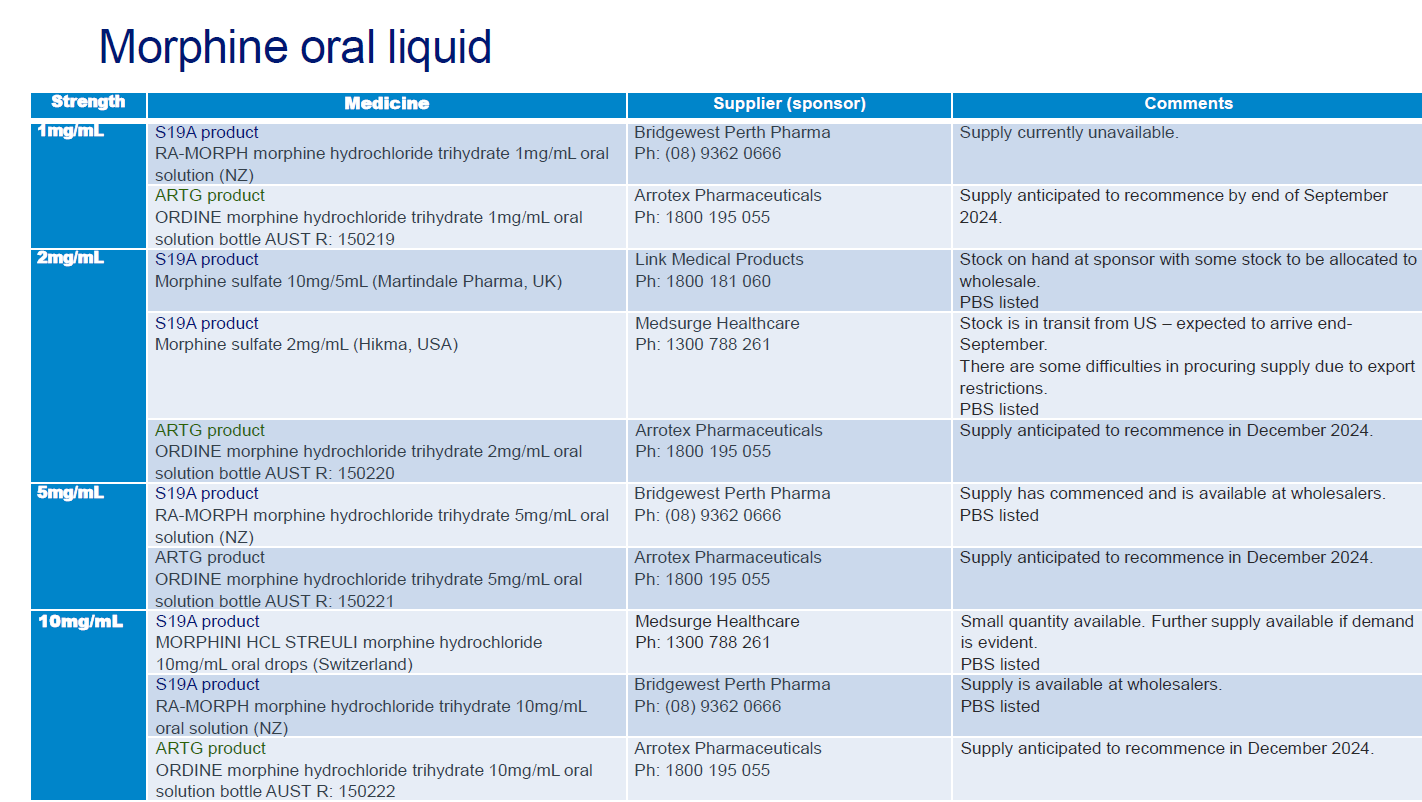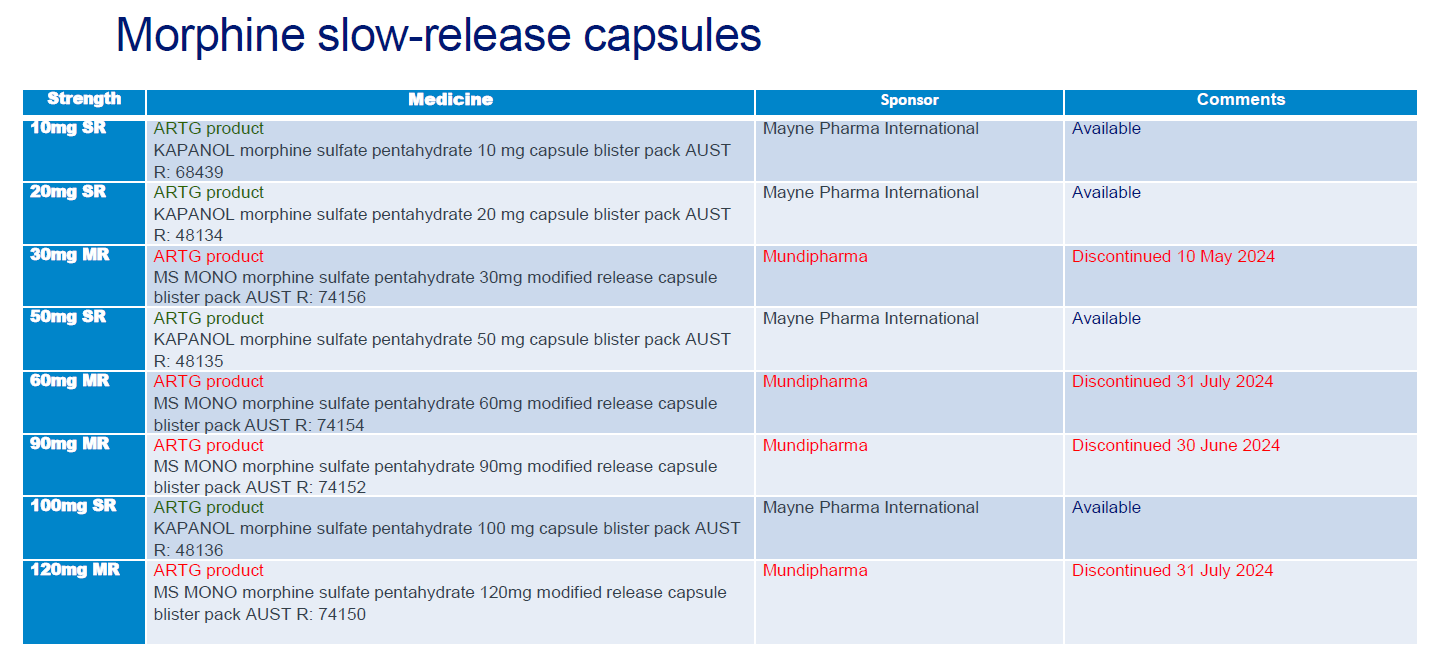Shortages of critical pain relief continue – advice to clinicians, 25 September update from TGA
Shortages of critical pain relief continue – advice to clinicians, 25 September update from TGA
Friday, September 27, 2024
Long standing challenges around the supply of critical pain relief medicines continue to cause anxiety and leave patients, their families, and health professionals distressed.
Compounding the issue further is that part of the longer-term solution has been delayed, with Arrotex advising that new supplies of the much anticipated Ordine liquid morphine, will now not start to be delivered until October to late-November, rather then late August as previously advised.
In the meantime, doctors, nurses, pharmacists, and carers are being asked to manage fluctuating supplies of a range of substitute medicines on a week-by-week basis.
“For many clinicians, the challenges around a lack of guaranteed supply of medicines has been ongoing for 18 months or more,” says Camilla Rowland, Chief Executive Officer, Palliative Care Australia (PCA).
“This is an issue the palliative care sector has been managing for too long, and right now PCA and our members around Australia are hearing from increasingly frustrated and distressed clinicians.”
Of particular concern is the current supply of oral liquid morphine products, critical for patients of all ages in the last phase of their life with diseases including cancer, advanced lung disease, and Motor Neurone Disease.
In early 2023, British pharmaceutical company Mundipharma announced it was removing it's oral liquid morphine (Ordine) from the Australian market. A license to make Ordine was subsequently given to Arrotex.
Following advocacy from the sector, the Therapeutic Goods Administration (TGA) sourced and approved a range of alternative temporary medicines (Section 19A products) to fill the gap while the new manufacturer of Ordine, Arrotex, established itself and supply.
However, supplies of the temporary medicines (Section 19A products) have also proven problematic and not provided the reassurance patients and the sector hoped for.
“We are in regular communication with the TGA on this issue and I want to thank them for their efforts to source alternative medicines as we all grapple with an ever more challenging global supply chain,” Ms Rowland says.
Current advice from the TGA regrading alternative temporary (Section 19A products) liquid morphine medicines, also included is information about PBS listing status of s19A products and availability of the Australian registered (ARTG) products:
*Supply information from TGA as at 25 September, 2024. This table will be updated as new information is received from the TGA. Please refer to date stamp. PCA is checking this advice regularly with the TGA and will update accordingly. Further information is available on the TGA website.
PCA Chair, and practising palliative care physician in south west Sydney, Prof Meera Agar says having to swap between various products to fill the gap in the supply chain is an unnecessary workaround with significant impacts for people where time is precious.
“Pain management requires an individualised approach. It’s work we do side by side with the patient and their carer, who is often the person administering this medication,” Prof Agar says.
“Use of a particular medicine is supported by experience, education, and evidence – but instead we find ourselves needing to ring around and find supplies, adding medical appointments, getting scripts, relearning a new medication regimen – and having to communicate that to people at a time where they are unwell.
“It’s easy to get confused about how to manage your medications when it keeps being swapped around depending on supply, not to mention the side-effects that can come from new and changing medicines.”
PCA Deputy Chair, Dr Peter Allcroft, is a palliative care specialist working in southern Adelaide, and is hopeful that once supplies of Ordine from the new supplier become available, the current pressure on fellow clinicians will ease.
“The ongoing difficulty with access to reliable medications has been a concern, particularly as these are medications that our clinicians feel comfortable with and have experience using,” Dr Allcroft says.
“While it has been reassuring to have other pain relief options available for the families in our care, it’s important to note that access to pain relief is a basic human right
“PCA and the sector more broadly would welcome the opportunity to work collaboratively with government to ensure that Australia has a stable supply of this critical medicine into the future.”
Early comment and advocacy on this issue: Ongoing pain medicine shortages risks quality of life for all Australians and Critical pain relief medicines at risk for people with cancer and terminal illness!



